| Home > Policy > White Paper, Notice, Announcement > White Paper > WHITE PAPER ON SCIENCE AND TECHNOLOGY2003 > Part1 1.3 1.3.2 1.3.2.1 | ||
| (1)Toward a Fuller Graduate School Education(Positioning of Graduate Schools) |
Universities,graduate schools,and other advanced education institutions are Japan's core research institutions for performing basic research,while at the same time they are institutions for educating and fostering the researchers and technicians of the next generation.Concerning graduate schools,in particular,most Master's degree courses in the natural sciences aim"to foster human resources with technical knowledge and capabilities,"while Ph.D.courses aim"to foster independent researchers in specialist fields" 4) .Moreover,in"A Vision of Universities in the21st Century and Reform Measures,"released in October1998by the University Council,the division of future responsibilities between universities(departments)and graduate schools should be,for university departments,education that emphasizes the foundations and basics of liberal arts education and technical fields in order to nurture basic capabilities that can be utilized by human resources in possession of a basic technical grounding,as well as the foundations for lifelong learning,and for graduate schools,education based on performing continued improvements of technical capabilities.
The actual researchers themselves recognize that education in graduate school is a necessary condition for fostering excellent researchers,and can be considered the most important period for acquiring a grounding as a researcher (Figure1-3-51) .
Note4)Japan University Accreditation Association,"Questionnaire Survey on the State of Graduate School Reform Implementation"(1997)
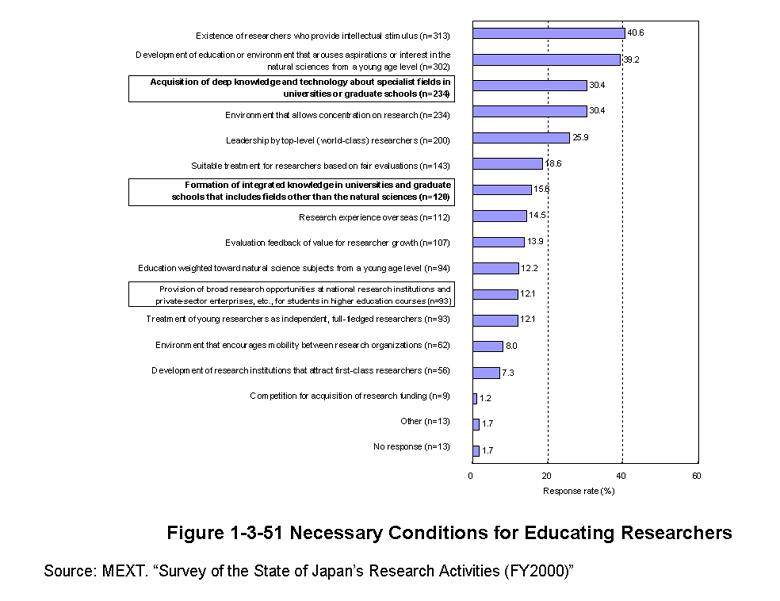
Development with the emphasis on qualitative and quantitative expansion is a critical issue,in order to boost education and research further at Japan's graduate schools,and to actively promote high-standard education and research at the world-class level.
Based on the University Council's frequent examination of this issue since1988,some universities,in order to ensure that graduate schools operate independently rather than relying on university departments,have strived for more flexibility by positioning graduate-level courses as the basic education and research organization in place of the university department,by working to reform instructor awareness and to revitalize school departments(prioritization of the graduate school),as well as by moving to develop non-research course modes that help graduate schools select for diversified growth and make possible efforts for qualitative expansion.
Moreover,while fostering researchers was the main focus of the graduate school system when it was first instituted,rapid technological innovation,the increasingly advanced,complex,and global-oriented society and economy,and other changes,have boosted the need at graduate schools for fostering advanced,technical specialists.
To better respond to these needs,professional training was added to the objectives of Master's and doctoral course programs,and a professional graduate school program(Master's degree course)was instituted,in1999.Furthermore,in response to a report by the Central Education Council in August2002,the program is now being further advanced through establishment of a professional school specializing in practical education concentrating on"fostering human resources with advanced and specialized technical skills."
Other methods being taken to instill more active acceptance of students in society include institution of one-year Master's degree courses,of courses extending over extra-long periods,and of correspondence-style graduate schools for more flexibility in programs.In addition,graduate schools are reviewing their education courses in response to establishment of course programs,and are promoting implementation of reforms in the preparation of course syllabuses,of research guidance programs involving multiple instructors,of faculty development(FD)programs 5) ,and of evaluations of courses by students.
| (Expansion of Graduate School Education) |
With graduate schools expanding so rapidly,the question remains whether the people who complete graduate school actually acquire the skills required for a researcher.When researchers were asked what elements and skills the ideal researcher would possess,the most common responses were creativity,experience in specialized areas,subject-setting ability and spirit of inquiry.Meanwhile,when researchers in leadership positions were asked to evaluate the skills of young researchers in recent years,they gave high marks for experience in specialized areas and for the spirit of inquiry,but lower marks for creativity and subject-setting ability (Figure1-3-52) .Cultivation of creativity and of subject-setting ability,therefore,is what people want of education at graduate schools,the supply source for young researchers.
On the university side,as well,reviews of education content and of education methods have been on-going since guidelines for accreditation of university establishment were announced in1991.Regarding this issue,here follows the results of the"The Survey on Implementation of Graduate School Reform,"conducted by the Japan University Accreditation Association in1997(unless otherwise stated,all results are limited to graduate-level science courses).
To begin with,the survey revealed that about half of graduate-level courses had already instituted reforms of education by the time of the survey,with nearly75%of such respondents reporting"to cope with interdisciplinary and emerging fields,"followed by"to integrate department and graduate school education"and"to cope with new social demands" (Figure1-3-53) .
In addition,for their efforts in regards to education and research guidance methods,the respondents reported such activities as"used a dialogue and debate education method"and"increased lectures for small groups,"while for efforts in research guidance by guidance instructtors,they"increased the amount of time spent in guidance in research labs,""entrusted research guidance to research institutions outside the school,"and"used a multiple guidance instructor system."
Other efforts to reform methods for education and research guidance implemented by many graduate-level courses included"publication of syllabuses,and course evaluation by students"and"re-investigation of instruction qualification conditions,and of qualification screening."
Note5)General name for organized efforts to improve and upgrade the content and method of instructors'courses.Specific examples include training sessions for newly appointed instructors,instructor participation and observation in each other's courses,and establishment of training centers.
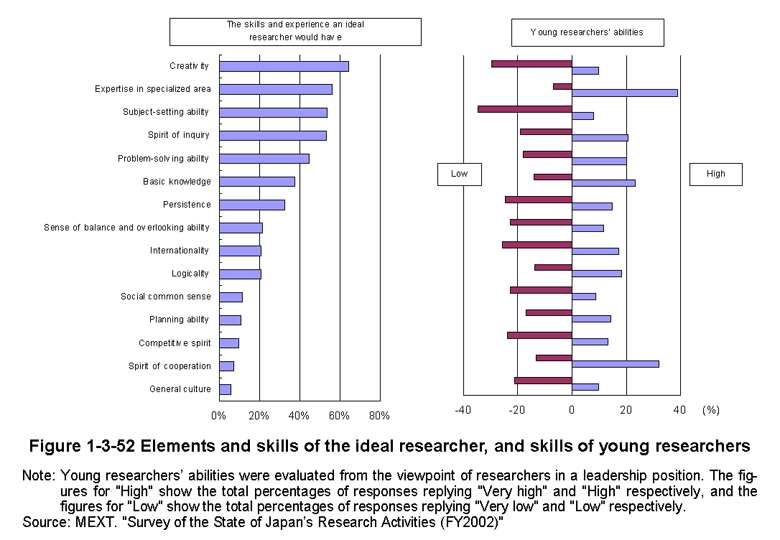
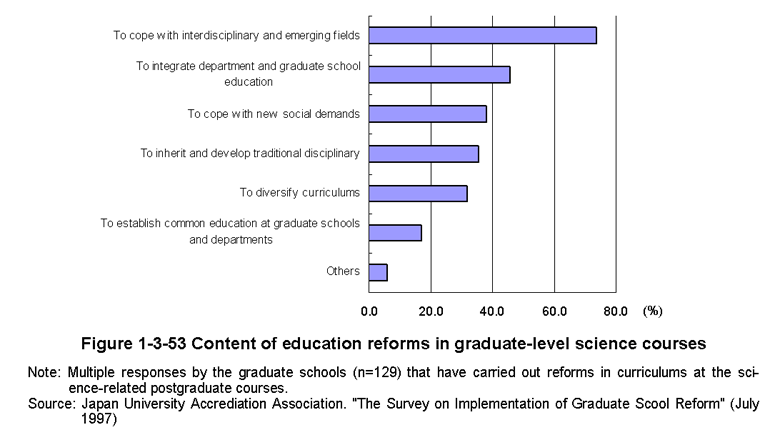
While universities are thus independently promoting reform efforts,barely over40%of respondents in graduate-level science courses,even including respondents at universities where reforms have already been implemented,believed that"rearrangement into lectures and courses suitable for graduate schools"had been adequately implemented.About30%of the univer-sities surveyed accepted that conditions are"somewhat inadequate,and reforms are continu-ing"and therefore recognize the need for still further reforms in the future (Figure1-3-54) .
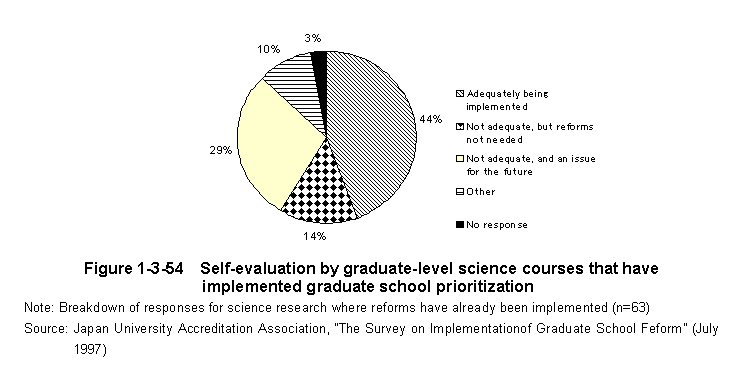
Elsewhere,the results of a questionnaire survey targeting national university instructors found that more than30% 6) of instructors in science,industry,and agricultural science believe that educational conditions are poor at the graduate schools associated with their universities,and suggested as policies for improvement"expanded implementation of research guidance"and"expanded implementation of research groups and workshops (Figure1-3-55) .
From the foregoing survey results,it would appear that while education reform at graduate schools is progressing steadily it remains unfinished.Further efforts will be needed in the future to expand the education content and methods that enable acquisition of"creativity,""subject-setting ability,"and other grounding and skills necessary for researchers.
Serious investigation into the issue of incur-poration of national universities,an element of university reform that has long been under consideration,began in July2000at the Council for Survey and Investigation into the Incorporation of National Universities,Etc.,into Independent Administrative Entities.Moreover,the Ministry of Education,Culture,Sports,Science and Technology announced the"Policy for Structural Reform of Universities(National Universities)"in June2001,and the policy also took a stance in favor of an early transition to incorporated universities.Later,the above council issued an interim report in September2001,followed by a final report in March2002,entitled"On the Image for a New'National University Corporation.'"As a result,the"National University Incorporation Bill"was presented to the Diet for its consideration in February2003.
Note6)The Japan Association of National Universities,"Current State and Issues of National University Graduate Schools"(March1996)
The following shows the proportion of respondents reporting that the current state of graduate schools for four education-related items is"very bad"or"bad."
(1)Balance between lectures,seminars,experiments,and practice,etc.,and research guidance(36.5%)
(2)Response to latest advances of guidance methods and content in relevant sector of study(41.2%)
(3)Good ratio of lectures,seminars,experiments,and practice,etc.,in the relevant sector of study(33.6%)
(4)Communication and cooperation between instructors regarding education content and research guidance(29.1%)
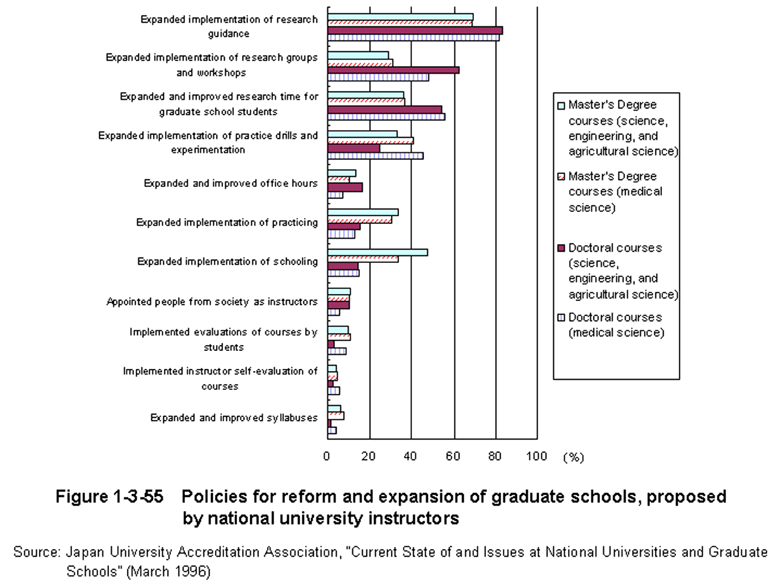
The incorporation of national universities is expected to lead to relaxation of various nationallevel rules and regulations regarding budgets,organization,personnel,and other aspects of university operations,which will result in more independence in university operations,while implementation of various creative measures will lead to the"creation of universities with distinction."These actions should lead to the emergence of advanced and revitalized education and research at national universities,and to the development of internationally competitive universities.
In1996,the old Ministry of Education's Industrial and Academic Roundtable on Fostering Creative Human Resources in the University Science and Engineering Fields,issued"On Fostering Creative Human Resources"to propose the following:
Based on this proposal,the Ministry of Education,Culture,Sports,Science and Technology proposed budget support and other measures for universities,and is engaged in promoting the following proposals. (1)Development of programs for cultivating student creativity,and
publication of information targeted at young people,or at society at large,regarding
the appeal of science and engineering fields
(2)Practical education centering on manufacturing (3)Joint corporate and university development and implementation of education programs (4)Student internships at private-sector corporations(work experience),etc.Here follows a couple of examples of university efforts toward fostering richly creative human resources in science and engineering.
|
| (2)Improvement in Economic Support for Graduate Students (The Present Living Conditions for Doctoral Students) |
In addition to the above-mentioned education problems for graduate school doctoral courses that constitute the core of researcher training,there are also various problems related to student living conditions.
Although the doctoral courses are an extremely important period for concentrating on research activities and fostering the necessary skills in researchers,the"Survey Results on Student Life(FY2000)"released by the Ministry of Education,Culture,Sports,Science and Technology found that63%of students in graduate doctoral courses are engaged in part-time jobs and,excluding those students who are supported by their families while going to school,58%of students reported that student life would be restrictive or impossible if they did not have part-time jobs (Table1-3-56) .In addition,an investigation of income and expenditures by residence type found that expenditures were invariably higher when part-time income was excluded from student life,regardless of whether the student resided in a family residence or in a student apartment (Table1-3-57) .

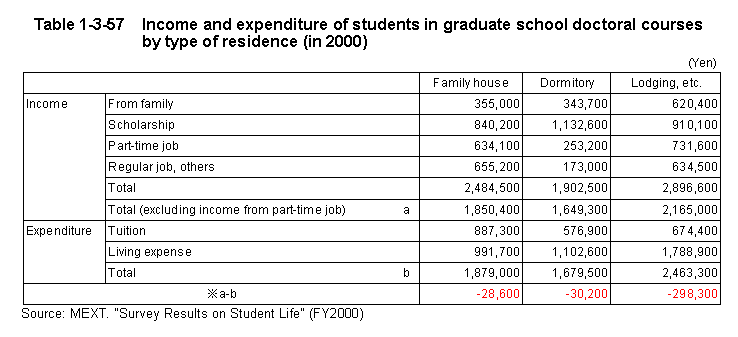
In a survey by the Ministry of Education,Culture,Sports,Science and Technology conducted on how much time students in graduate school doctoral courses spend on various activities,the students spent an average of about63hours per week as graduate school students,of which research activities account for about45hours,or about71%of the total active student time.The time spent by students on their own research activities,toward preparation of a doctoral thesis was only about58%of the total student activity time,with the remaining time including13%of the total time spent in other research activities in support of a mentor professor's research activities,about15%spent in non-research graduate school activities such as class courses or guidance of other students in the university department,and about14%spent in activities related to assistance for operation of academic societies or other activities related to the student's own specialty,a situation that highlights how little time graduate school doctoral course students have to spend on their own research activities (Table1-3-58) .

For a look at scholarship funds,which constitute one source of economic support for graduate school students,the number of people receiving grants from the Japan Scholarship Foundation has been increasing,as has the proportion of students in graduate school (Figure1-3-59) .In particular,policies for scholarships that will involve payment of interest have changed in recent years,with the introduction of selectable grant amount occurring in FY1999,as well as grant reception standards being relaxed in terms of academic requirements and family income,and the scale of funding being greatly expanded.
In addition to the Japan Scholarship Foundation,there are a wide range of public entities,local government authorities,schools,and private-sector enterprises that are engaged in scholarship funding.
The universities,as well,offer economic assistance to students through introduction of such programs as the RA(research assistant)and TA(teaching assistant)programs.Further expansion of this type of economic assistance could result in conversion of time spent at part-time jobs outside of the universities into more time for the students'own research activities,becoming linked with learning experiences in creativity,skill in setting issues,and other elements for researchers (Figure1-3-60) .
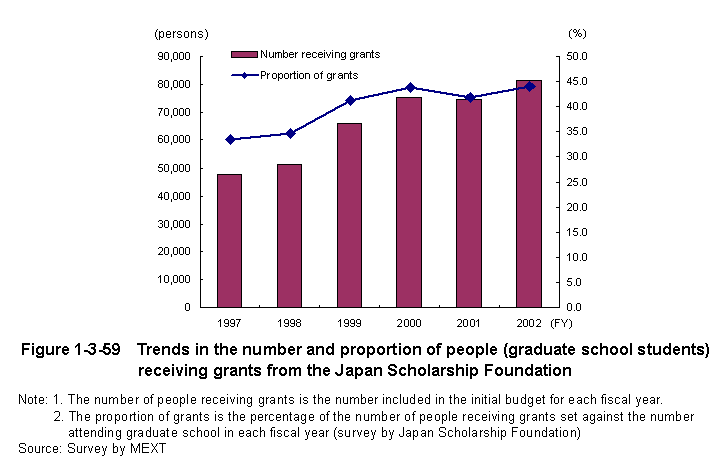
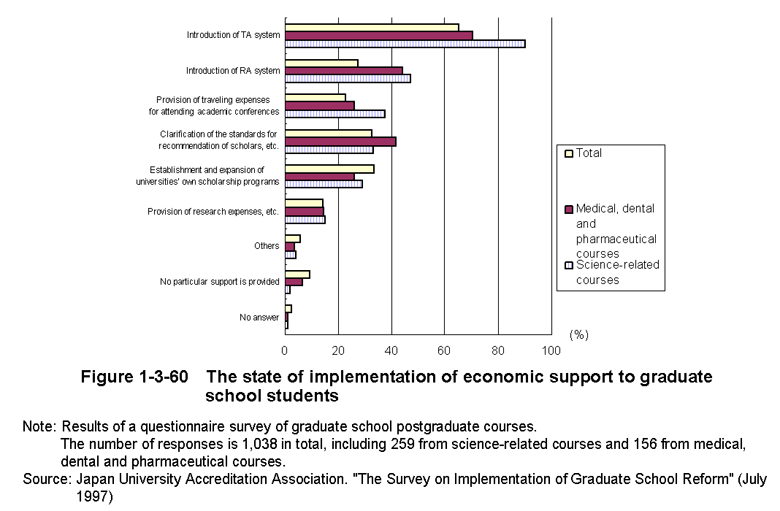
The Science and Technology Council's Human Resources Committee report,"Toward Fostering World-Class Researchers(July2002),"found that about40%of graduate school students in the United States receive adequate economic assistance in the form of fellowships or other funding that cover tuition fees and living expenses.In Japan,by contrast,only6%of doctoral course students receive adequate assistance for studies and research(among special research fellows of the Japan Society for the Promotion of Science).
From the above,it appears that,in addition to the need for expansion of education content at graduate schools,environments that facilitate more economic assistance for graduate school students so that they can concentrate on research activities need to be developed and expanded.In addition,systemic reform of the various economic assistance programs to ensure their more flexible use is important,as is more skill in their operation at universities.
| (Economic Expectations of Going into a Doctoral Course) |
To examine the appealing economic conditions that arise from advancement to doctoral course level,here follows an estimate of the opportunity costs for the three years advancing through the doctoral curriculum after completion of the Master's degree program.In doctoral programs at national universities,for example,tuition fees and other expenses amount to1.78million yen.Assuming that a person entering the workforce immediately after completing the Master's degree program earns about10.82million yen 7) during the first three-year period,the opportunity cost for advancing to the doctoral program becomes12.60million yen.If such a student then enters the workforce immediately after procuring a Ph.D.,the person's lifetime earnings must amount at least12.60million yen more than a person who did not advance to the doctoral course level in order for those three extra years in graduate school to be economically appealing.
By contrast,the proportion of private-sector enterprises offering higher starting level salaries to graduates with Ph.D.'s than to graduates with Bachelor's or Master's degrees(at45.8%of respondents)was less than the proportion offering the same starting salaries regardless of graduate level(at49.4%) (Figure1-3-61) .In addition,a survey of researchers aged at or around40years found that,at most companies,differences between employees in terms of promotion and salaries tend to reflect performance and skills,or years of experience,and very few companies report paying attention to academic level (Figure1-3-62) .So even if companies offer special initial compensation for academic level,compensation after several years tends to be based more on ability and results,and the chances that many Ph.D.holders are securing income that exceeds their opportunity costs appears to be rather low.
A look at average salaries for the technologists in the United States who work at private-sector enterprises,by number of years since obtaining their latest academic level,reveals a definite disparity depending on the academic level obtained.Even when the comparison was extended to19years after acquisition of the Ph.D.,total income was about11%more for Ph.D.holders.These results show that advancement to the doctoral course level offers definite economic benefits later on (Figure1-3-63) .
Note7)National Personnel Authority,"State of Private-Sector Salaries(2002)."This is three years worth of annual salary(salary raises not taken into consideration)calculated based on the average starting monthly salary(216,287yen)plus bonus and temporary employment salary(an average4.68months worth)of newly graduated researchers(completed graduate school Master's degree course).
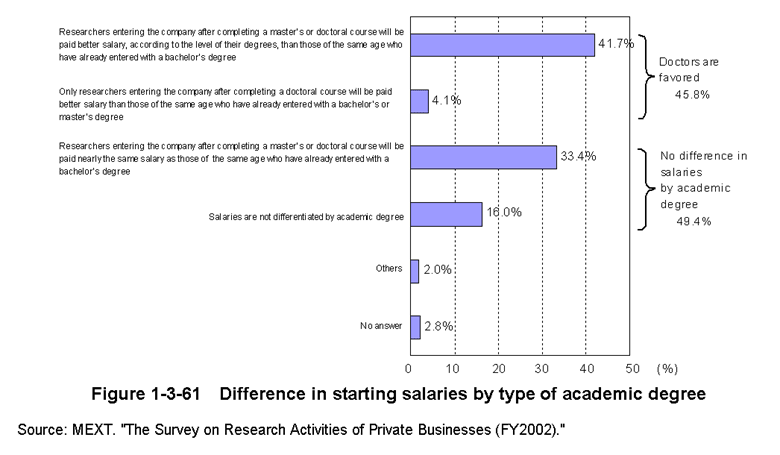
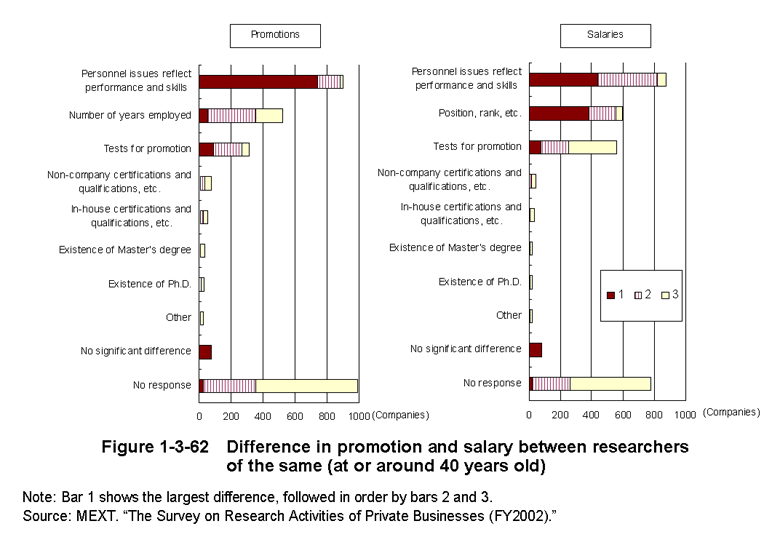
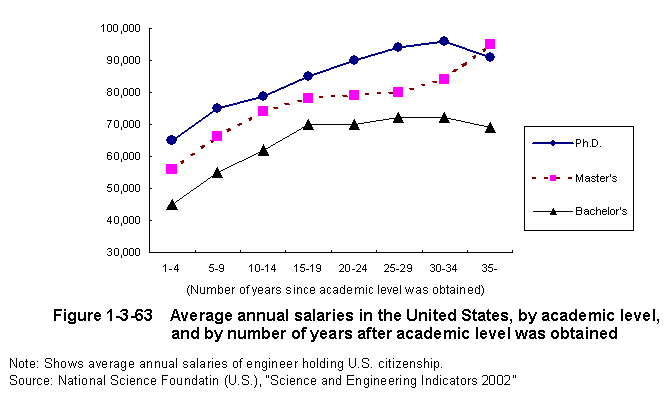
Of course,while it is certain that people do not advance to the doctoral course level for economic reasons alone,if Japan is to become an advanced science-and technology-oriented nation,it is essential that the human resources who have nurtured and polished their knowledge,technology,and creativity in doctoral courses be allowed to demonstrate those capabilities in real society,and to obtain income levels that commensurate with effort.
| Back to Top | MEXT HOME |